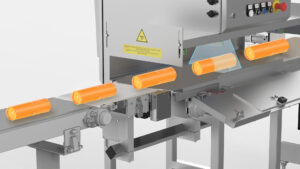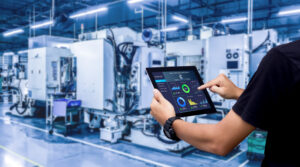In today's era, Industry 4.0 has become a ubiquitous term in business and technology. But what does it really mean and how is it transforming the industrial landscape? In this article, we will explore concrete examples of Industry 4.0 and how it is revolutionising the way businesses around the world operate.
INDUSTRY 4.0: EXAMPLES OF
TECHNOLOGICAL TRANSFORMATION
by marketing on 5 de December de 2023
Industry 4.0: Examples of technological transformation
What is Industry 4.0?
Before diving into specific examples, it is essential to understand what Industry 4.0 means. Simply put, it refers to the fourth industrial revolution, characterised by the integration of advanced technologies into manufacturing and production processes. This technological transformation is driven by automation, artificial intelligence, the Internet of Things (IoT) and digitalisation.
In the following, we will explore some examples that illustrate this revolution.
In the following, we will explore some examples that illustrate this revolution.
Example 1: Smart manufacturing
One of the most notable applications of Industry 4.0 is smart manufacturing. Factories are adopting advanced technologies to improve efficiency and product quality. For example, IoT-connected sensors constantly monitor machines on the production line. These sensors can detect problems before they become serious failures and automatically schedule preventive maintenance.
In addition, artificial intelligence is used to optimise manufacturing processes. Algorithms can analyse real-time data to automatically adjust machine speeds, inventory levels and delivery logistics. This not only reduces costs, but also improves quality and production speed.
In addition, artificial intelligence is used to optimise manufacturing processes. Algorithms can analyse real-time data to automatically adjust machine speeds, inventory levels and delivery logistics. This not only reduces costs, but also improves quality and production speed.


Example 2: Logistics and supply chain
Industry 4.0 is also revolutionising supply chain management. Companies are using advanced technology to track and manage their products from production to delivery. Drones and autonomous vehicles are used for product delivery, speeding up the process and reducing logistics costs.
Digitisation of the supply chain enables greater visibility and control. Companies can track product locations in real time and predict demand more accurately. This reduces delivery errors and improves customer satisfaction.
Thanks to Varpe's Research and Development department, adapting traceability systems to our equipment gives us total control of your production.
Digitisation of the supply chain enables greater visibility and control. Companies can track product locations in real time and predict demand more accurately. This reduces delivery errors and improves customer satisfaction.
Thanks to Varpe's Research and Development department, adapting traceability systems to our equipment gives us total control of your production.
Example 3: Predictive maintenance
Another compelling example of Industry 4.0 is predictive maintenance. Instead of performing regularly scheduled maintenance, companies can take advantage of real-time monitoring and data analytics to predict when maintenance is needed. This helps to avoid unplanned downtime and reduce maintenance costs.
An application example would be in the industrial sector, with VIT4 software, its data collection and production tracking predicts when maintenance tasks on checkweighing equipment should be performed. This has resulted in increased operational efficiency and a significant reduction in maintenance costs.
Varpe's VIT4 software is designed to store and manage the data generated by the equipment during production in pursuit of Industry 4.0.
An application example would be in the industrial sector, with VIT4 software, its data collection and production tracking predicts when maintenance tasks on checkweighing equipment should be performed. This has resulted in increased operational efficiency and a significant reduction in maintenance costs.
Varpe's VIT4 software is designed to store and manage the data generated by the equipment during production in pursuit of Industry 4.0.


Example 4: Connected products
Industry 4.0 has also led to the proliferation of connected products. From smart appliances to autonomous vehicles, IoT is transforming the way we interact with everyday objects. In the industrial sector, quality control equipment such as checkweighers and x-ray inspection equipment, thanks to software that connects to your production line remotely.
These products not only offer greater convenience, but also provide companies with an invaluable source of data. They can gather information about how their products are used and how customers interact with them. This allows them to make continuous improvements and personalise the user experience.
These products not only offer greater convenience, but also provide companies with an invaluable source of data. They can gather information about how their products are used and how customers interact with them. This allows them to make continuous improvements and personalise the user experience.
Example 5: Precision farming
Even in traditional sectors such as agriculture, Industry 4.0 is having a significant impact. Precision farming uses technologies such as drones, sensors and data analysis to optimise agricultural production. Integrated solutions with Varpe equipment improve the production process by being able to monitor results in real time, allowing them to make informed decisions about production.
This technological transformation not only increases agricultural productivity, but also contributes to sustainability by reducing the use of resources such as water and fertilisers.
This technological transformation not only increases agricultural productivity, but also contributes to sustainability by reducing the use of resources such as water and fertilisers.

Industry 4.0 is fundamentally changing the way businesses operate around the world. These examples are just the tip of the iceberg of how the integration of advanced technologies is driving efficiency, quality and innovation across a wide range of industries.
As we continue to move forward in this era of digital transformation, it is essential that companies are ready to adapt and take advantage of these opportunities. Those that embrace Industry 4.0 will be better positioned to compete in an increasingly connected and technological world. The industrial revolution is underway, and those that embrace it will reap the benefits of innovation and efficiency in their operations.
As we continue to move forward in this era of digital transformation, it is essential that companies are ready to adapt and take advantage of these opportunities. Those that embrace Industry 4.0 will be better positioned to compete in an increasingly connected and technological world. The industrial revolution is underway, and those that embrace it will reap the benefits of innovation and efficiency in their operations.
